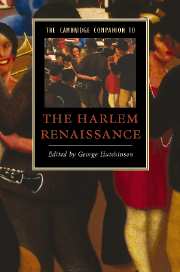Book contents
- Frontmatter
- Introduction
- Part I: Foundations of The Harlem Renaissance
- Part II: Major Authors and Texts
- 4 Negro drama and the Harlem Renaissance
- 5 Jean Toomer and the avant-garde
- 6 “To tell the truth about us”: the fictions and non-fictions of Jessie Fauset and Walter White
- 7 African American folk roots and Harlem Renaissance poetry
- 8 Lyric stars: Countee Cullen and Langston Hughes
- 9 “Perhaps Buddha is a woman”: women’s poetry in the Harlem Renaissance
- 10 Transgressive sexuality and the literature of the Harlem Renaissance
- 11 Sexual desire, modernity, and modernism in the fiction of Nella Larsen and Rudolph Fisher
- 12 Banjo meets the Dark Princess: Claude McKay, W. E. B. Du Bois, and the transnational novel of the Harlem Renaissance
- 13 The Caribbean voices of Claude McKay and Eric Walrond
- 14 George Schuyler and Wallace Thurman: two satirists of the Harlem Renaissance
- 15 Zora Neale Hurston, folk performance, and the “Margarine Negro”
- Part III: The Post-Renaissance
- Further Reading
- Index
5 - Jean Toomer and the avant-garde
from Part II: - Major Authors and Texts
Published online by Cambridge University Press: 28 July 2007
- Frontmatter
- Introduction
- Part I: Foundations of The Harlem Renaissance
- Part II: Major Authors and Texts
- 4 Negro drama and the Harlem Renaissance
- 5 Jean Toomer and the avant-garde
- 6 “To tell the truth about us”: the fictions and non-fictions of Jessie Fauset and Walter White
- 7 African American folk roots and Harlem Renaissance poetry
- 8 Lyric stars: Countee Cullen and Langston Hughes
- 9 “Perhaps Buddha is a woman”: women’s poetry in the Harlem Renaissance
- 10 Transgressive sexuality and the literature of the Harlem Renaissance
- 11 Sexual desire, modernity, and modernism in the fiction of Nella Larsen and Rudolph Fisher
- 12 Banjo meets the Dark Princess: Claude McKay, W. E. B. Du Bois, and the transnational novel of the Harlem Renaissance
- 13 The Caribbean voices of Claude McKay and Eric Walrond
- 14 George Schuyler and Wallace Thurman: two satirists of the Harlem Renaissance
- 15 Zora Neale Hurston, folk performance, and the “Margarine Negro”
- Part III: The Post-Renaissance
- Further Reading
- Index
Summary
In 1923, amongst the many reviews of Jean Toomer's Cane, came two of very contrasting opinion. Disdaining “certain innovators who conceive language to be little more than a series of ejaculatory spasms,” the Minneapolis Journal suggested “if the Negro (and the south) is to become really articulate its new writers must seek better models than those Mr Toomer follows.” In contrast, the African American critic Montgomery Gregory, writing in the first issue of Opportunity, soon to become the pre-eminent forum for the incipient New Negro Renaissance, waxed more lyrical:
“Fate has played another of its freakish pranks in decreeing that southern life should be given its most notable artistic expression by the pen of a native son of Negro descent . . . Verse, fiction and drama are fused into a spiritual unity, an “aesthetic equivalent” of the Southland . . . “Cane” is not OF the South, it is not OF the Negro; it IS the South, it IS the Negro - as Jean Toomer has experienced them.
Despite their differences in opinion, these reviews nonetheless shared the evaluative criteria that characterized the reaction to Cane - and determined its importance - both in 1923 and in most of the subsequent (and voluminous) criticism devoted to it. Both were concerned with the effectiveness of the formal innovations and formal eclecticism of the work; with how well Jean Toomer had found either a voice or an “aesthetic equivalent” for the South; and to what degree Toomer was a “representative man,” a figurehead and a model for subsequent African American writing.
- Type
- Chapter
- Information
- The Cambridge Companion to the Harlem Renaissance , pp. 71 - 81Publisher: Cambridge University PressPrint publication year: 2007
- 3
- Cited by



